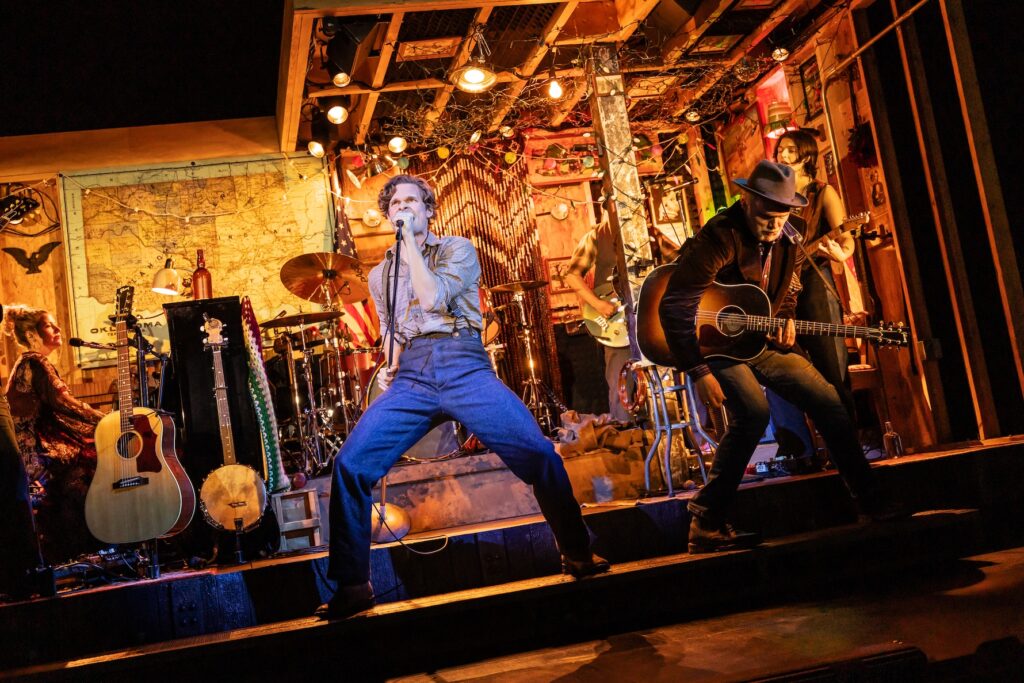The Blackest of Comedies, ‘Dead Outlaw’ Ignores No Opportunity for Deliciously Inappropriate Humor
Like ‘Floyd Collins,’ currently making its Broadway bow as well, ‘Outlaw’ draws on a true story to document American enterprise carried to a chilling extreme.

“Your mama’s dead/Your daddy’s dead/Your brother’s dead/And so are you”: Who would have thought that one of the catchiest tunes introduced in a Broadway musical this season would feature this refrain?
“Dead,” the rollicking number with two reprises showcasing this chorus — which also announces the passing of an eclectic array of famous folks, living and deceased, from Abe Lincoln and Anne Frank to John Stamos and Zendaya — is just one of the giddily morose tunes on tap in “Dead Outlaw,” a show that made its debut off-Broadway last spring.
Like “Floyd Collins,” currently making its Broadway bow as well, “Outlaw” draws on a true story to document American enterprise carried to a chilling extreme. Yet where “Collins” becomes hauntingly meditative in following an intrepid explorer who found himself trapped in a Kentucky cave back in 1925, “Outlaw” finds pitch-black but often exuberant comedy in a longer and stranger episode.
That would be the tale of one Elmer McCurdy, born in Maine in 1880 and killed by police in Oklahoma in 1911 after years of unruly and criminal activity that concluded with a rather unsuccessful train robbery. After his body went unclaimed, it was preserved in arsenic by a resourceful undertaker who then put it on display for paying visitors.
The corpse eventually drew the interest of a pair of even more ambitious carnival owners, and over the next five decades McCurdy’s mummified body was shuttled between various other people hoping to make a profit; it wound up in side shows, a wax museum, and an amusement park, and even with a director of exploitation films who used it as a promotional device.
Composer/lyricists David Yazbek and Erik Della Penna, playwright Itamar Moses, and director David Cromer — acclaimed veterans who also collaborated on the Tony Award-winning “The Band’s Visit,” except for Mr. Della Penna, a highly regarded performer and songwriter of rock and roots music — mine these developments for all their black-comic potential, ignoring no opportunity for deliciously inappropriate humor.
The lankily handsome rising star cast as Elmer, Andrew Durand, channels his character’s sometimes violent intensity through the first half of the one-act show, but then spends most of the second simulating his corpse as it’s pushed and prodded into various positions. Jeb Brown amiably leads a band that occupies center stage throughout the show, its musicians sometimes interacting with the actors, mostly in deadpan silence.

Mr. Brown also doubles as Walter Jarrett, one of a gang of bank robbers who enlist Elmer, then posing under a series of false identities he assumes during his short and turbulent life, to help them blow up safes; each operation goes hilariously awry.
Other actors juggle an assortment of often eccentric characters, many based on real-life figures. Louis Sonney, played by a dry Ken Marks, runs a museum dedicated to presidents and outlaws, or as he calls them “honest men” and “maniacs.” Thom Sesma appears as Dr. Thomas Noguchi, the coroner who finally gives Elmer’s body proper treatment some 65 years after his death — but not without fondly recalling famous patients who died gruesomely, among them Natalie Wood and Sharon Tate, in a parody of a cabaret number that becomes a cheesy, sleazy showstopper.
The score also nods to genres from reggae to industrial rock, though its textural core is Americana: There are several lovely, folky ballads, as well as more driving numbers such as “Something From Nothing,” delivered by some of the various characters eager to cash in on Elmer’s body, with lyrics like, “Now I’m an entrepreneur/Death is a business to me.”
On the other hand, there’s “Millicent,” sung by the daughter of that filmmaker who uses the body to titillate audiences, storing it at home in between appearances. Where the grownups in “Outlaw” look at Elmer and see dollar signs, Millicent, played by Julia Knitel with grace and understated wit, sees a quiet confidante whom she can trust with her deepest secrets and most tender growing pains.
“What would you do if you were me?” the girl asks the corpse. It’s an unexpectedly poignant moment, one of a few in “Dead Outlaw”; mostly, though, this musical will make you laugh in the face of greed, horror, and misfortune — so forgive yourself in advance.

